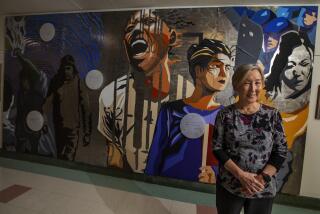Top research universities join to boost minority science faculty
As an African American man pursuing a PhD in the sciences, Geoff Lovely has sometimes had to overcome a feeling that he didn’t belong in the halls of top research universities where he saw few peers of color.
The Caltech student is intent on becoming a professor “where I think I can definitely make an impact” becoming a role model for other minority students interested in the sciences.
A new venture announced Thursday aims to smooth a path for students like Lovely by joining the resources of four of California’s top research institutions -- UCLA, Caltech, UC Berkelely and Stanford -- to increase the numbers of minority faculty and researchers in national laboratories and industry.
The California Alliance for Graduate Education and the Professoriate is funded with a $2.2-million grant from the National Science Foundation to support underrepresented minority students -- African Americans, Latinos, American Indians, Pacific Islanders and others -- in math, physical and computer sciences and engineering.
The project is rare for institutions that frequently are in competition for research dollars, top-flight faculty and the most academically qualified students.
The four schools combined produce nearly 10% of the nation’s underrepresented PhDs in the sciences and engineering.
“We felt that, institution to institution, we would have a lot in common,” said Mark Richards, a leader of the project who is UC Berkeley’s executive dean of the College of Letters and Science. “Sometimes it’s good instead of competing to collaborate and share ideas and practices and create a sense among underrepresented students that they are part of something a little bigger than their own institution.”
The schools will research effective practices and attitudes that help prepare students for an academic life, train faculty to better help students reach their goals, and create an online database of participants and their research interests.
Other activities include an annual retreat -- the first is scheduled to be in April at Stanford -- and a competition for several annual postdoctoral fellowships.
A unique feature of the project will encourage students to seek mentors among partner institutions, said Richards.
A Caltech physics student, for example, might receive financial support to spend a week at UC Berkeley to discuss a project or seek advice on landing a faculty position.
Data compiled among the partner schools from 2011 found that of 845 new PhD students in sciences and engineering, 81 were from underrepresented minority groups. Fifty-nine of 753 doctoral degrees awarded in the fields went to minority students, and only 58 of 1,050 postdoctoral students in math, physical and computer sciences and engineering were from the underrepresented groups.
Among 1,189 faculty members in sciences and engineering, only 51 were from underrepresented groups.
Faculty members of color can change the culture of a department and provide a more qualified perspective on the attributes of students from disadvantaged communities who may not have the highest grades or test scores, said Carlos Grijalva, associate dean of the Graduate Division at UCLA and a professor of behavioral neuroscience.
He is one of eight underrepresented minority professors among 74 faculty members in the psychology department.
“I have experienced that myself,” said Grijalva. “The conversation changes when they see you’re at the table and may have a somewhat different agenda.”
Jenna Jones, a fifth-year PhD student in health policy management at UCLA, said she has received great mentoring and support from faculty of all races but hopes the new project will boost the presence of minorities in academia.
“I believe when people are able to see a person of authority and prestige that looks like them, they can envision themselves in that role in the future,” said Jones, who is one of the few African Americans in her program.
At Caltech, Lovely said, biweekly chats that bring minority graduate students together to share experiences have helped relieve stresses. But he said he was also exceptionally fortunate to have three black male faculty members to call on in his field of biochemistry and molecular biophysics.
“We’re one of the most endangered species in all of education,” said Lovely, 27, “so the concentration of black males at Caltech has had an amazing influence on me.”
Twitter: @CarlaRiveraLAT
More to Read
Start your day right
Sign up for Essential California for news, features and recommendations from the L.A. Times and beyond in your inbox six days a week.
You may occasionally receive promotional content from the Los Angeles Times.







